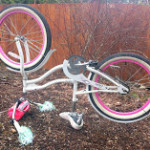Guest Blogger Adonia E. Lugo is an anthropologist and activist who uses ethnographic research on bicycling to advocate for social justice in urban sustainability. A doctoral candidate at the University of California, Irvine, she is currently writing a dissertation about human infrastructure for bicycling in Los Angeles, where she co-founded City of Lights/ Ciudad de Luces (now Multicultural Communities for Mobility) and CicLAvia. Adonia is also the co-founder of the Bicicultures Research Network, a community of social scientists who study bicycling as a social and cultural phenomenon. She blogs as Urban Adonia and currently lives in Seattle, where she has been interviewing community leaders for the Seattle Bike Justice Project, supported with funding from Washington Bikes and Bike Works.
This post is a follow-up on Adonia’s piece from last week:
All kinds of people have formed communities around bicycling; there’s no right and wrong way to be a bicyclist. There are lots of clubs that organize recreational rides, and for many years, there’s been a movement of bicyclists setting up do-it-yourself repair collectives grounded in social and economic justice, and these co-ops can be important community centers and useful resources for education and affordable bike repair. Here is a directory of bike collectives.
Some groups are working to build communities around equity in bicycling, developing programming that supports marginal bicycle users and helps create new images of bicycling.
Here in Seattle, Bike Works has expanded their work with youth to start facilitating workshops at community-based organizations to help adults and families get started with biking.
The Bicycle Alliance and Bike Works also funded the Seattle Bike Justice Project last year, which interviewed community leaders in Rainier Valley about their perspectives toward bicycling
And Seattle Neighborhood Greenways has worked to build an informed and community-based group to design bicycle and pedestrian infrastructure in Rainier Valley
I asked my network of scholar-activists who study bike cultures to send me information about programs like this, and here’s what we came up with for the U.S. This isn’t an exhaustive list, so feel free to send your suggestions to adonia at urbanadonia dot com.
Multicultural Communities for Mobility in Los Angeles
Community Cycling Center in Portland
Biking Public Project in New York City
Cycles for Change in Minneapolis
Read Adonia’s earlier post on our blog: Dr. Martin Luther King, Jr.’s Legacy and Bicycling: How Do We Build a Coalition for Bicycle Justice?



